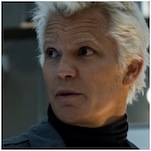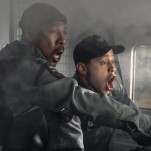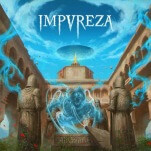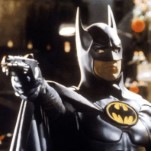The Act of Killing
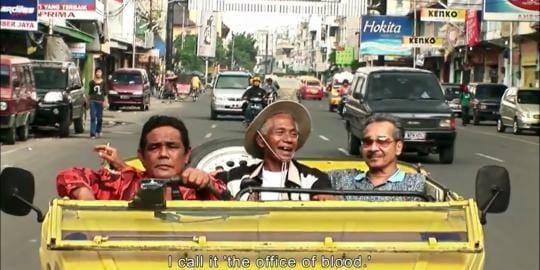
Some tragedies are so horrific that it’s hard to reconcile one’s belief in the basic decency of human beings with the atrocities that some of them have perpetrated. Documentary filmmaker Joshua Oppenheimer’s The Act of Killing focuses on one of the darkest chapters of the 20th century, speaking to some members of the Indonesian death squads who slaughtered hundreds of thousands of their countrymen and women in 1965 and ’66. These people don’t live in the shadows, though: They’re treated like royalty in their native land, celebrated as heroes who helped “save” Indonesia from communism. The film is so shocking and depressing that its subjects’ utter disconnection from morality would almost be funny if it wasn’t so frightening.
Oppenheimer amplifies those conflicting reactions further by introducing a daring gambit. In the process of interviewing these butchers—who brag about raping and killing their victims (including the occasional beheading)—the director asked if they would be interested in re-creating their murders through fictionalized, filmed scenes. The men—most notably a gentleman named Anwar Congo, who was one of the death squad leaders—leapt at the chance, in part because they grew up on gangster films. (Before being recruited by the military, which had overthrown the country’s government, people like Congo worked as black-market movie theater ticket sellers.) And so Congo and his goons, now all rich and middle-aged, play dress-up for parts of The Act of Killing, casting themselves as heroes torturing their communist foes.
As an opening crawl indicates, Indonesia’s military labeled anyone who opposed its rule as communists as a way to tar its enemies and justify its genocidal plans. The Act of Killing illustrates that, more than 45 years later, the country is still far from acknowledging its previous barbarism: Local TV stations breathlessly interview Congo about his film project, the cheerful hostess reminding the at-home viewer that Indonesia is better off without those godless communists around. The extent of the intimidation is such that one of Oppenheimer’s two co-directors is billed simply as “Anonymous,” and indeed several of the crew members receive the same moniker out of fear for their lives.
-

-

-

-

-

-

-

-

-

-

-

-

-

-

-

-

-

-

-

-

-

-

-

-

-

-

-

-

-

-

-

-

-

-

-

-

-

-

-

-










